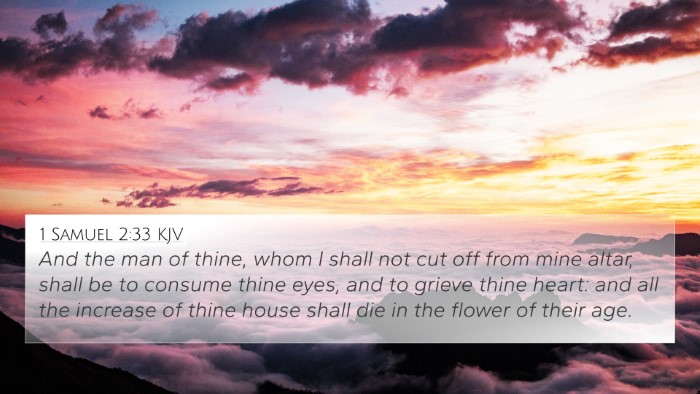Understanding 1 Corinthians 7:36
1 Corinthians 7:36 states: "But if any man think that he behaveth himself uncomely toward his virgin, if she pass the flower of her age, and need so require, let him do what he will; he sinneth not: let them marry."
This verse deals with issues of marriage, celibacy, and the appropriate conduct regarding a betrothed woman. The Apostle Paul provides guidance on how to navigate the complexities of relationships and marriage in light of the Christian faith.
Commentary Insights
Drawing insights from public domain commentaries, such as Matthew Henry, Albert Barnes, and Adam Clarke, we can better understand Paul’s message in this chapter:
-
Matthew Henry:
Henry emphasizes the seriousness of relationships and the necessity of making decisions that honor God and the individuals involved. He highlights that allowing a relationship to progress to marriage is permissible if there is a strong desire and necessity for it.
-
Albert Barnes:
Barnes notes that the term “uncomely” indicates a failure to act in a manner that is consistent with propriety. He conveys Paul's intent that if a man feels a duty to marry due to circumstances and mutual feelings, he should proceed without guilt. It reflects the theme of personal agency and moral responsibility in relationships.
-
Adam Clarke:
Clarke discusses the options available to individuals regarding marriage versus celibacy. He stresses that if the feeling to marry is genuine and the woman is of age, the man should not hesitate to marry. Clarke also addresses the cultural context of engagement and the common practices of his time.
Cross-References
This verse can be understood in a broader context through these related scripture passages:
- 1 Corinthians 7:2: Addresses the need for marital relations to avoid sin.
- 1 Corinthians 7:9: Discusses the importance of marriage for those who struggle with self-control.
- Ephesians 5:31-33: Explores the profound mystery and significance of marriage.
- Genesis 2:18-24: Illustrates God’s institution of marriage as a union between man and woman.
- Proverbs 18:22: Highlights the blessing of finding a wife.
- Hebrews 13:4: Encourages honor within the marriage bed.
- Song of Solomon 8:6-7: Poetic imagery of love and passion in relationships.
Thematic Connections
Understanding 1 Corinthians 7:36 opens a discussion on several themes prevalent in the Bible:
- The Call to Holiness: Relationships must reflect a commitment to God and holiness.
- Marriage as a Sacred Institution: God established marriage as a foundational relationship.
- Personal Responsibility: Individuals are called to make decisions that honor God amidst complex situations.
- Love and Desire: Love is acknowledged as a legitimate reason for marriage.
Conclusion
The verse and its commentaries guide readers toward understanding the balance between duty and desire within the framework of Christian teachings on relationships. The Apostle Paul's guidance is timeless, offering wisdom for those navigating the challenges of love and commitment.
Further Study
For those interested in deepening their understanding of this verse, consider utilizing tools for Bible cross-referencing and engaging in cross-reference Bible study methods. These approaches can provide valuable insights into the connections between biblical texts and their implications for contemporary life.





